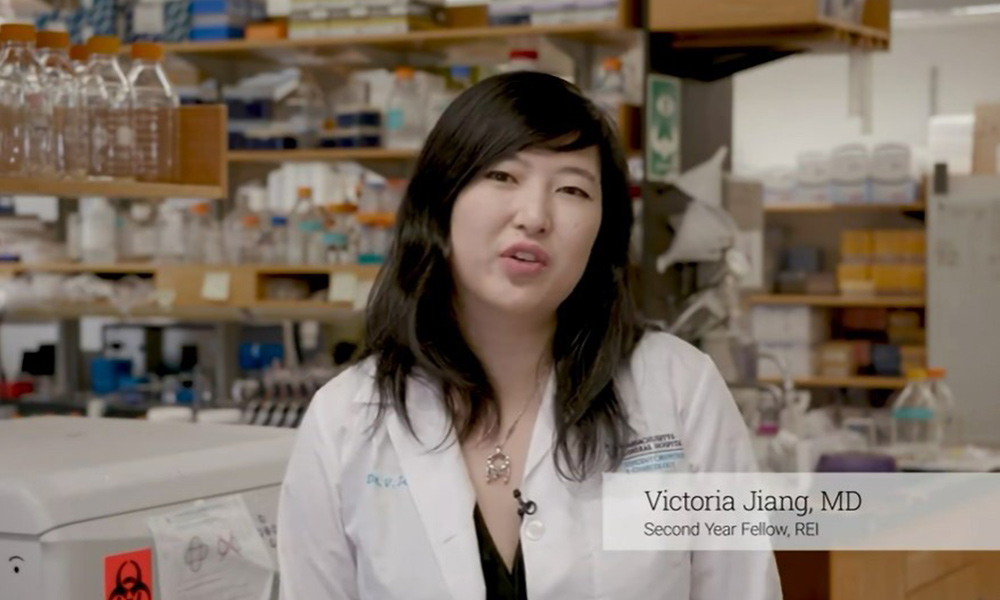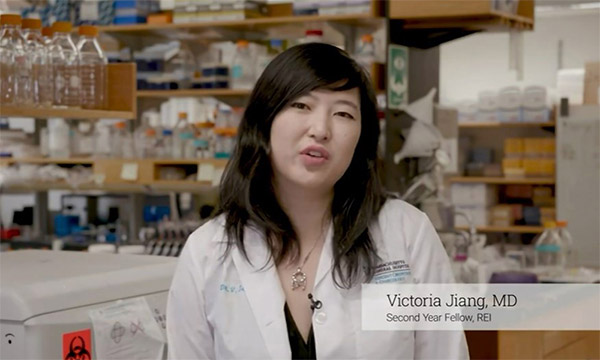The Reproductive Endocrinology and Infertility (REI) Fellowship accepts one fellow every year for a three-year training period. Fellowship training is divided equally between clinical and research activities. Formal didactic sessions include enrollment in courses and attendance at weekly rounds and conferences. Clinical activities take place primarily in the Fertility Center in the Department of Obstetrics and Gynecology at Mass General. The basic scientific research activities occur primarily within the Vincent Center for Reproductive Medicine.
Program Objectives
- To provide the highest quality of clinical care for our patients with reproductive endocrine, infertility and other disorders related to reproductive health
- To be exemplars of education in academic medicine by being outstanding teachers
- To train our fellows in clinical care, reproductive surgery, research and teaching and promote excellence in future careers in the specialty
- To conduct basic and clinical research with the goal of advancing the discipline of reproductive biology and surgery and translating these developments to the clinical arena.
Curriculum
Year 1 Focus: Research
The first year is devoted primarily to research with the faculty of either the Vincent Center for Reproductive Biology (VCRB) or the Harvard T.H. Chan School of Public Health (HSPH) to learn the basic research skills required to address important issues in reproductive biology and reproductive epidemiology.
The first year covers a wide breadth of topics:
- Investigation in the VCRB covering all facets of reproduction and reproductive endocrinology
- The utilization of in vitro and in vivo models
- Practice on a full range of molecular techniques
Notably, you will be given the opportunity to design, implement and critically review basic research projects with the potential for relevant clinical applications. In addition, graduate-level courses related to basic or clinical research will be completed.
Year 2 Focus: Research and Clinical Practice
During the second year, you will continue research projects initiated in Year 1, but now will focus on clinical activities.
As a second-year fellow, you will learn to evaluate and treat a variety of medical problems including:
- Infertility
- Polycystic ovarian syndrome
- Hirsutism
- Premature ovarian failure
- Endometriosis
- Dysfunctional uterine bleeding
- Issues related to menopause
Fellows participate daily in the Fertility Center, learning the skills of assisted reproduction including:
- Transvaginal ultrasonography
- Gonadotropin management
- Oocyte retrieval Intrauterine insemination
- Embryo transfer
- Office hysteroscopy
- Sonohysterogram
Fellows observe in the embryology laboratory as well, learning gamete biology and handling, including exposure to micromanipulation and attend several weekly clinical conferences.
Year 3 Focus: Surgical Techniques
During the third year, you will continue ongoing basic and clinical research projects, work in the bimonthly-supervised REI continuity clinic and assist with important REI inpatient consults. A major focus of this year is training in surgical techniques critical to the specialty, principally endoscopic procedures including robotic surgery. Hands-on training is provided in the department's simulation center, where box trainers and laparoscopic simulators provide basic skills such as camera control, hand-eye coordination, tissue grasping, and suturing skills. You will assist with surgical cases several days a week.
In addition, rotations of approximately two months duration will be arranged in related fields:
- Pediatric endocrinology
- Medical and neuroendocrinology
- Male infertility
- Menopause
- Genetics
While on each subspecialty rotation, you will participate in relevant conferences, rounds and clinics. The third year also includes directed didactic teaching sessions in endocrine assays and reproductive pathology.
Third-year fellows are expected to assume a leadership role within the program and facilitate communication between the fellows and the rest of the team. Administrative responsibilities include coordinating the call schedule, M&M Grand Rounds and updating the shared fellow's network drive with important dates, call schedules, clinic schedules and any other appropriate educational or clinical items. During candidate interviews, the third-year fellow is responsible for coordinating the presentation, tour and other fellow activities for the day.
Our goal is to evolve the third-year fellow as a junior faculty member of academic practice with progressive responsibility clinically and administratively throughout the three-year fellowship.
About the Fertility Center
The Fertility Center at Mass General is located in the Yawkey Center for Outpatient Care, New England's largest ambulatory care center. The building includes state-of-the art facilities to house the entire Reproductive Medicine and IVF Unit. We provide fertility services in an environment specially designed to ensure couples the most modern technology and the utmost in comfort, convenience and confidentiality. It contains a state-of-the-art embryology laboratory, private offices for physicians and dedicated workspace for nursing staff. It also features fully equipped procedure and recovery rooms. Our space promotes continuity of care and supports our goal of delivering individualized patient care.
In addition to OB/GYNs, our team includes anesthesiologists who attend all IVF procedures and urologist Ajay Nehra, MBBS, who specializes in male factor infertility. Dr. Nehra provides reproductive urology expertise to the division as a full-time REI faculty member and trains fellows in male infertility, including a two-month rotation during the third year.
Research Opportunities
Vincent Center for Reproductive Biology
The Vincent Center for Reproductive Medicine (VCRB) is a state-of-the-art research facility that was developed in 1995 to serve as a nucleus of scientific endeavors in the OB/GYN Department. Since its inception, the center has become the cornerstone for research related to reproductive health issues.
There are numerous projects ongoing within the VCRB, and at present, we are most focused on:
- Ovarian and uterine cancer
- Fetal/maternal interactions
- Menopause
- Infertility
- Ovarian cell signaling
Our overall research mission is to overcome infertility, improve healthcare both for non-pregnant and pregnant patients and ease the menopausal transition in patients, with basic, translational and clinical research.
While fellows are encouraged to be involved in multiple projects, you will design your own unique project to generate a publication, which will be defended at the end of your fellowship. Fellows work side by side with visiting scientists, postdoctoral fellows and students who are here to gain further knowledge in basic and clinical sciences related to reproduction. The VCRB provides a unique environment that exposes fellows to an integrated clinical and basic research program in preparation for future academic careers.
Work in the VCRB also includes weekly lectures designed to enhance understanding of molecular biological techniques and their application to clinical practice, along with attendance at weekly laboratory meetings to discuss VCRB projects.
The Harvard T.H. Chan School of Public Health
Harvard T.H. Chan School of Public Health traces its roots to public health activism at the beginning of the last century, a time of energetic social reform. The Harvard School of Public Health has been successfully researching environmental chemicals and how they relate to reproductive health issues through the EARTH (Environment and Reproductive Health) Study. Our overall research mission is to explore how exposure to environmental chemicals and lifestyle choices (such as diet) affects reproductive health. We are specifically studying how environmental chemicals and diet impact the ability to get pregnant.
Our Fellows
Current Fellows
- Evelyn Minis, MD
- Christopher Arkfeld, MD
- Alexa Sassin, MD
Previous Fellows
Our fellows go on to practice in a wide variety of clinical and academic settings.
View our previous fellows
- Jill Attaman, MD – Boston IVF, Boston, MA
- Inna Berin, MD – Fertility Institute of New Jersey & New York
- Eden Cardozo, MD – Women’s and Infant Fertility Center, Providence, RI
- Irene Dimitriadis, MD – Mass General Fertility Center, Boston, MA
- Carla Digirolamo, MD – IVF New England Lexington IVF Center, Lexington, MA
- Joseph Doyle, MD – Shady Grover Fertility, Rockville, MD
- Karissa Hammer, MD – Institute for Human Reproduction, Chicago IL
- Jennifer Hsu, MD – Shady Grover Fertility, Rockville, MD
- Anthony Imudia, MD – Florida Hospital Wesley Chapel, Tampa, FL
- Victoria Jiang, MD - Shady Grove Fertility, Atlanta, GA
- Annatte Karmon, MD – Fertility Institute of Hawaii, Honolulu, HI
- Allison Lange, MD – RMA King of Prussia, PA
- Amy Lee Harris, MD – Wright Patterson AFB, Ohio
- Hadi Ramadan, MD - Boston IVF, Boston, MA
- Fernanado Roca, MD – Harvard Vanguard Medical Associates, Somerville, MA
- Mary Sabatini, MD, PhD – Mass General Fertility Center, Boston, MA
- Caitlin Sacha, MD - Fertility Solutions, Boston, MA
- Aleksandar Stanic-Kostic, MD – University of Wisconsin School of Medicine and Public Health, Madison, WI
- Aaron Styer, MD – CCRM Boston
How to Apply
The Reproductive Endocrinology & Infertility Program at Massachusetts General Hospital is a three-year fellowship accredited by the Accreditation Council for Graduate Medical Education (ACGME). All candidates must have completed a four-year obstetrics and gynecology residency accredited by either the ACGME or RCPSC. The REI Fellowship Program is a member of the National Resident Matching Program (NRMP) and complies with the NRMP guidelines. Applicants must register with the NRMP.
Applications are accepted through Electronic Residency Application Service® (ERAS), an online application service. In addition, we require submission of CREOG scores directly to Jessica RoySmith (jroysmith@mgh.harvard.edu).
Please note when applying: There are two ACGME-accredited REI fellowship programs affiliated with the Brigham & Women’s Hospital/Massachusetts General Hospital Integrated Residency Program.
Our program (ACGME #2352422002) is located exclusively at the Massachusetts General Hospital (MGH) site with Mass General teaching faculty.
Application Timeline
The program will adhere to the SREI standardized process for interviews with dates updated in accordance with the SREI Fellowship Application calendar.
- May 1, 2025: (1 pm EST): Application deadline for consideration of first round of interview offers
- June 4, 2025: First round of interview offers delivered electronically
- June 11, 2025 (1 pm EST): Deadline to accept/decline first round interview offers. Failure to respond will be considered declining the invitation. Subsequent interview offers may then be extended to candidates who are waitlisted or submitted applications after the May deadline
- June 20, 2025: Deadline for alerting invited candidates of interview date and time and notification to all candidates of their status (i.e. invited for interview; wait-listed; or rejected)
- July 25, 2025: Virtual interviews
- August 1, 2026: Fellowship position begins
Apply now
Contact Information
Jessica RoySmith
Program Director: Irene Souter, MD
Phone: 617-726-8868





